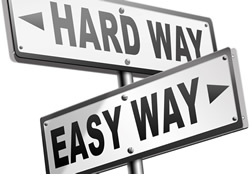Travis Bradberry* says it is only when you move outside your comfort zone that you can accomplish great things.
 T.S. Eliot was clearly onto something when he asked: “If you aren’t in over your head, how do you know how tall you are?”
T.S. Eliot was clearly onto something when he asked: “If you aren’t in over your head, how do you know how tall you are?”
The very act of stepping outside of your comfort zone is critical to your success and wellbeing.
Our brains are wired so that it’s difficult to take action until we feel at least some stress and discomfort.
If you’re too comfortable your performance suffers from inaction.
However, if you move too far outside your comfort zone you melt down from stress.
Peak performance and discomfort go hand in hand.
Stepping outside of your comfort zone makes you better, and it doesn’t have to be something as extreme as climbing Mount Everest.
It’s the everyday challenges that push your boundaries the most.
Step out of your comfort zone and embrace these challenges.
Get up early: Unless you’re a morning person, getting up earlier than usual can take you way out of your comfort zone.
However, if you get up well before you have to start getting ready for work, it’s worth it.
It gives you an opportunity to collect your thoughts and mentally prepare yourself for the day ahead.
It also gives you the opportunity to eat a good breakfast and exercise, both of which have well-known health benefits.
Accomplish an ‘impossible’ goal: Few things compare to the exhilaration of accomplishing something that you didn’t think you were capable of.
Maybe it’s running a marathon or giving a keynote speech at a convention.
These accomplishments are worth every bit of suffering you endure to achieve them.
Once you finally do it, you feel invincible and carry that triumph with you forever.
Meditate: It’s easy to get stuck in your comfort zone when you’re so busy that you don’t slow down enough to really think about what you’re doing.
Meditation is a great way to break this cycle and also happens to be very good for your brain.
Harvard neuroscientist, Sara Lazar found that meditation creates important physical changes in your brain.
It increases brain density in areas responsible for self-control, focus, problem-solving, flexibility, and resilience.
Focus on one thing at a time: Focusing completely on a single task carries the risk of failing at something to which you’ve given your all.
That’s why it’s so uncomfortable.
The alternative – multitasking – is a productivity killer.
Researchers have found that people who are regularly bombarded with several streams of electronic information cannot pay attention or recall information as well as those who complete one task at a time.
When you spread yourself too thin and chase after every bright, shiny thing that catches your eye, you’re missing out on an important opportunity for personal growth.
Volunteer: It would be great if everyone volunteered for purely altruistic reasons, but we all have demands on our time and have to set priorities.
The problem is that after a long workday, volunteering can get pushed down the list.
Volunteering is a powerful experience that feels good and expands your network at the same time.
Practice public speaking: You’ve likely heard that the majority of people fear public speaking more than death.
It’s a challenge. It’s also worth it.
Whether you’re addressing five people around a table or an audience of 5,000, becoming a better public speaker can be a huge boon to your career.
Talk to someone you don’t know: Unless you’re an extreme extrovert – or a politician – talking to new people probably can make you uncomfortable.
Do it anyway. Social interaction is good for your mood, expands your network, exposes you to new ideas, and boosts your self-confidence.
Bite your tongue: It can feel good to unload on somebody and let them know what you really think, but that good feeling is temporary.
It’s human nature to want to prove that you’re right, but it’s rarely effective.
In conflict, unchecked emotion makes you dig your heels in and fight the kind of battle that can leave you and the relationship severely damaged.
When you read and respond to your emotions, you’re able to choose your battles wisely.
Say no: The more difficulty that you have saying no, the more likely you are to experience stress, burnout, and even depression.
No is a powerful word that you should not be afraid to wield.
Saying no to a new commitment honours your existing commitments and gives you the opportunity to successfully fulfil them.
Quit putting things off: Change is hard. Self-improvement is hard.
Scrounging up the guts to go for what you want is hard, and so is the work to make it happen.
When things are hard, it’s always easier to decide to tackle them tomorrow.
The problem is that tomorrow never comes.
Staying in your comfort zone means stagnation.
Just as an oyster only makes a pearl when it’s irritated by a grain of sand, no one has ever accomplished anything remarkable when comfortable.
*Travis Bradberry is the co-founder of TalentSmart, a provider of emotional intelligence tests, training and certification. He can be reached at TalentSmart.com
This article first appeared on the TalentSmart website.











